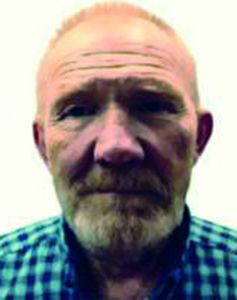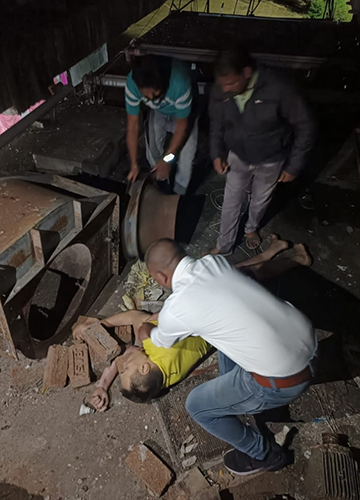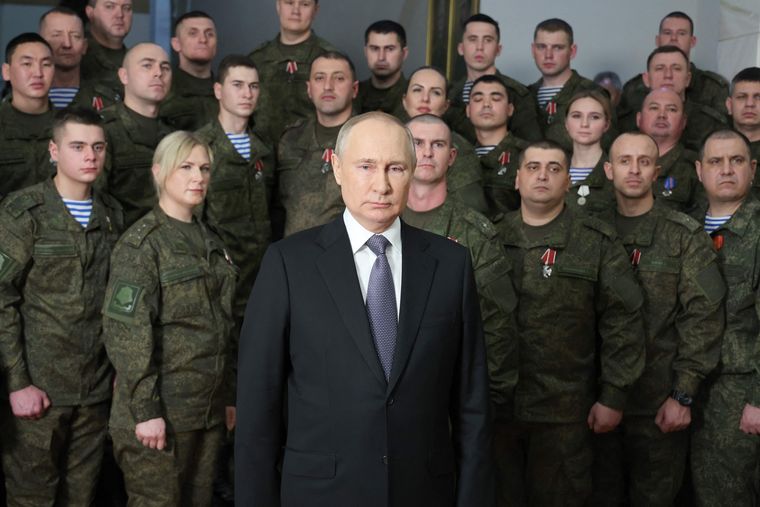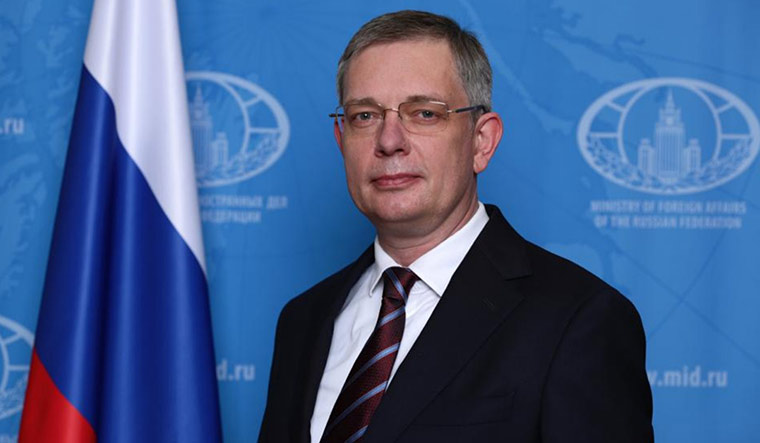After the kidnapping of two Italian tourists by Maoists in Kandhamal district a decade ago, Odisha is once again in the international spotlight, following the suspicious deaths of three Russians within a fortnight. The first two deaths were reported from the border district of Rayagada in the last week of December. Pavel Antov―a businessman and lawmaker, and a bitter critic of President Vladimir Putin―died after allegedly falling from his hotel’s third floor on Christmas eve. His friend Vladimir Bydanov was found dead barely 48 hours before that in the hotel room they shared in Rayagada. On January 3, the body of Sergy Miyalkov, a marine engineer employed by an Indian company, was found on board a cargo ship at Paradip port’s anchorage.
Antov, 65, and Bydanov, 61, arrived in Delhi on December 18. They reached Bhubaneswar the next day with two more Russians, Natalia Pansasenko and her husband, Mikhail Turov. The group was accompanied by their guide, Jitendra Singh. They first visited Daringbadi, a hill station in Kandhamal district, and reached Rayagada on December 21, where they checked in at hotel Sai International.
To accommodate the growing inflow of foreign tourists, nearly 40 hotels have come up in Rayagada, catering to various budget categories. The town is the headquarters of Rayagada district in southern Odisha, on the border with Andhra Pradesh. The district has a majority tribal population and is home to Dangaria Kandha, a particularly vulnerable tribal group (PVTG), which lives on the Niyamgiri hills spread across Rayagada and the neighbouring Kalahandi district.
Around 40km from Rayagada town is Chatikona, where a tribal market assembles every Wednesday. It attracts a large number of Dangaria Kandhas. Foreign tourists, too, frequent the market from November to February as they are no longer allowed to go up the hill after the kidnapping of the Italian tourists. Rajesh Patnaik, a senior journalist from Rayagada, said around 200 tourists from North America, Australia, the UK and Russia come and live in Rayagada during the winter to experience the tribal lifestyle. District tourist officer Subodh Chhatriya said foreign tourists were interested in exploring the life of PVTGs like the Dangarias and they frequent the specific route from Kandhamal to Koraput via Rayagada.
When Antov and his friends checked in at the hotel on December 21, they were given three rooms. It was Antov’s birthday and he shared a room with Bydanov. The group was supposed to travel to Koraput the next day, but Singh said the plans got cancelled as Bydanov was found unconscious in his room. “We rushed him to the hospital where he was declared dead,” said Singh. It was suspected that he suffered a cardiac arrest. Aurobind Sahu, owner of the hotel, said the Russians were to vacate the hotel that day. “But things turned topsy-turvy because of the unfortunate incident,” he said.
Bydanov’s postmortem report said there was around 100ml of liquor in his stomach and that the body smelled of ganja and opium. Singh said Bydanov, who had been taking medicines for some heart ailment, was drinking from the time he landed in Odisha. On 21st night, he was heard arguing with Antov and the duo had an altercation in their room, according to the hotel staff. Local police found the room in a mess. The floor was littered with food, empty liquor bottles and broken plates.
After preliminary investigations ruled out any foul play, Bydanov’s body was cremated on December 24 at the local crematorium. Antov performed the last rites after receiving the necessary clearance from the Bydanov family in Russia, which came through the consulate in Kolkata. After Bydanov’s death, Antov moved to another room. He returned to the hotel after the cremation in an agitated mood. Around 7:30pm, he was found in a pool of blood in a nearby construction site on the hotel premises. He was taken to the hospital, where he was pronounced dead.
Antov’s postmortem examination was held on December 25 and he was cremated next to Bydanov’s final resting place. The cremation was performed after getting the approval of his daughter through the consulate. The postmortem report said there was “rupture of the left lung, liver and spleen leading to haemorrhage and death”. The death was subsequently deemed “accidental”.
Because of the high-profile stature of the victims, especially Antov, and the controversy over the deaths of several Putin critics over the past few years, the Odisha Police has assigned the investigation to its crime branch. It is also being monitored by the Intelligence Bureau and the ministry of external affairs. The Russian embassy is also being kept in the loop. Sunil Kumar Bansal, director general of Odisha Police, said prima facie, no foul play was detected.
The report of the mysterious death was picked by western media, which quickly linked Antov’s death to his opposition to Putin’s policies and the Russian war in Ukraine. They also highlighted how several Russians who had failed to align themselves to Moscow’s line on the war―which will complete a year next month―had died mysteriously. Antov, a millionaire sausage tycoon and a regional MP from the central Vladimir oblast, was in the news last year following his criticism of the war. He was, however, forced to withdraw his comments, possibly after facing pressure from the authorities.
The mysterious deaths of the Russians seem to be snowballing into a political controversy as well. The Congress has been critical about the manner in which the investigation is being conducted. Former MP Manish Tewari said the decision to cremate the bodies was suspicious, especially since the victims were Christians. “Hercule Poirot says burnt bodies tell no tales,” tweeted Tewari, referring to the famous fictional detective created by Agatha Christie. Denis Alipov, the Russian ambassador to India, was quick to respond, taking Tewari on and complimenting the police. “It would be useful for some Hercule Poirot lovers to learn that cremation in Russia is as customary as burial. Idleness is the root of all evil,” tweeted Alipov. Meanwhile, Congress MP from Koraput, Saptagiri Ulaka, who hails from Rayagada, said he would raise the issue in Parliament as he felt the incident had implications for national security.
The Odisha crime branch clarified that they got in touch with Bydanov’s son and Antov’s daughter through the Russian consulate in Kolkata and found out that cremation was not uncommon in Russia. “Antov’s daughter, Anna, said her grandmother, too, was cremated a few years ago,” said a crime branch official. “She did not object to her father’s cremation as the practice is common in Russia.” She had also given her written consent for the cremation. Officials enquired why Antov’s family chose not to take his body back to Russia and found that he had been staying alone after divorcing his second wife. Other family members, too, did not show any interest in taking his body back. Bydanov’s son, too, sent his consent for his father’s cremation.
Negligence shown in preserving evidence adds to the headache of the investigating agencies as critics point towards multiple lapses in the postmortem examination and initial investigation. While the hotel staff told the police that Antov appeared to be heavily drunk and could not walk properly after returning to the hotel from Bydanov’s cremation, the autopsy report is silent on the presence of alcohol in his blood. Even more crucially, while Bydanov’s viscera samples were preserved for further tests, similar procedure was not followed in Anton’s case.
Samples of liver, heart, spleen, lungs and kidney are sent for forensic examination when investigators or doctors feel that the cause of death is not clear from the postmortem examination. “Antov had multiple injury marks over his body, which may be the result of his fall from a height. Besides, the police did not specifically ask for sending his viscera samples,” said a doctor from the forensic team. Lalmohan Routray, chief medical officer of Rayagada, confirmed that only Bydanov’s viscera had been preserved.
Experts have questioned the negligence shown by the investigating authorities. Former Odisha DGP B.B. Mishra said viscera samples should have been kept for further examination. He was also critical of the fact that Antov’s postmortem examination was not videographed or photographed, although the procedure was followed in the case of Bydanov. A doctor at the Rayagada government hospital said the police did not ask the medical team to record the autopsy or to preserve viscera samples. “Videography and visceral sample preservation were done in the case of Bydanov’s postmortem examination following specific instructions from the Rayagada police,” he said.
As many as 17 prominent Russians who were critical of the Kremlin’s policies reportedly met with fatal accidents in the past one year. With three suspicious deaths of Russian citizens happening in a fortnight, the Odisha Police have their task cut out.






